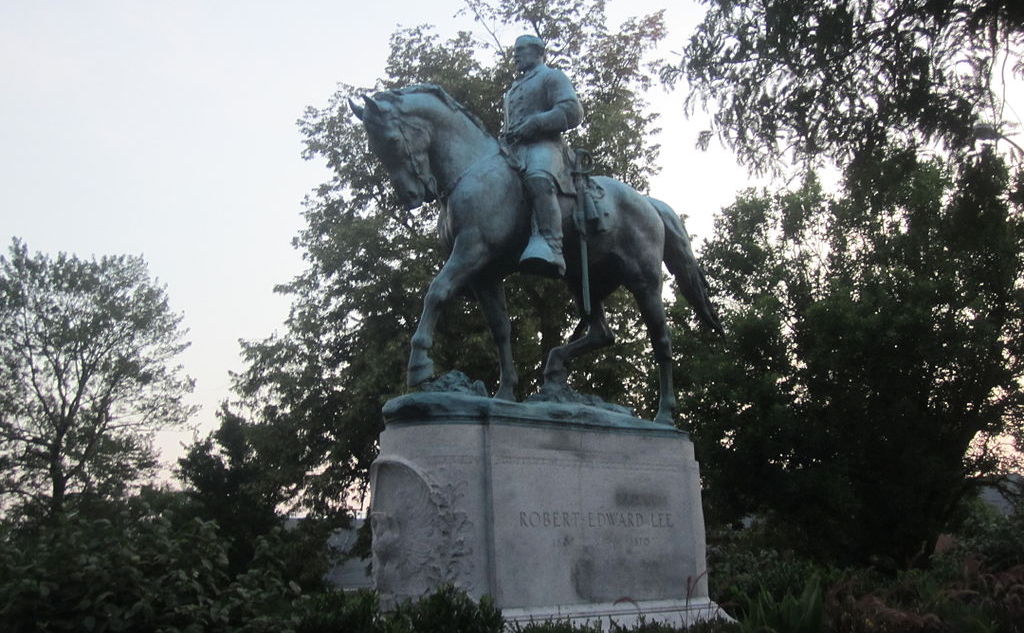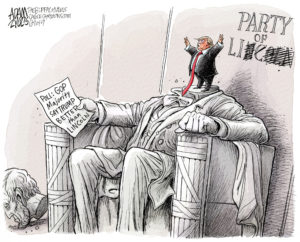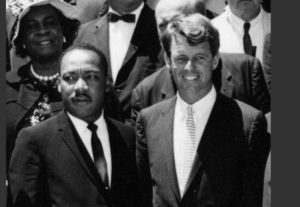Robert E. Lee Still Divides and Kills
The icon of the Confederacy and architect of its defeat cost humanity uncounted lives—right up to now. Robert E. Lee statue in Charlottesville, Va. (Billy Hathorn / Wikimedia)
Robert E. Lee statue in Charlottesville, Va. (Billy Hathorn / Wikimedia)
Yet another deadly firestorm now swirls around Robert E. Lee. As his statues head to the ash heap, a life defined by slavery, betrayal and slaughter again divides our nation.
Lee was an icon of the Confederacy and the architect of its defeat. He was a traitor to the United States of America. He cost humanity uncounted lives … right up to now.
Lee’s gentlemanly portraits are a surface illusion. He could be gracious and chivalrous, a dashing strategist and later a beloved college president.
But his core was medieval and obsolete. He was the ultimate undertaker of a culture of death.
Robert was the son of Henry “Lighthorse Harry” Lee, a Revolutionary officer descended from Virginia’s early slaveowners. But in the early 1800s, he served a year in debtor’s prison, and died when Robert was 11, leaving the family disgraced and in dire straits.
Robert excelled in mathematics and graduated West Point near the top of his class. He served as an engineer and pathfinder in the American conquest of Mexico, where he fought alongside Ulysses S. Grant, who would ultimately defeat him.
In 1859 Lee arrested and hung John Brown after his legendary attempt to deliver weapons from the federal arsenal at Harper’s Ferry, Va., to a slave revolution.
In personal letters, Lee questioned secession and doubted chattel slavery. But bitter controversy still surrounds his treatment of the slaves on his own plantation.
Abraham Lincoln offered Lee a high command in the Union army. Instead he led Southern armies against the nation of his birth. That act of treason cost countless lives and still divides our nation.
Though his first first commands were mixed, Lee was a far superior tactician to most early Union generals. His key campaigns protected Richmond, threatened Washington, D.C., and inspired the Confederacy to press ahead.
But victory fed Lee’s arrogance. In July 1863, while foolishly attacking the North at Gettysburg, he ordered the legendary “Pickett’s Charge” that cost some 7,000 lives in a matter of moments, breaking the back of the Confederate Army.
As the slaughter dragged on, droves of poor whites fled Lee’s army. To combat desertion, he ordered a mass hanging, and marched his infantry past the corpses.
Thankfully, at war’s end, Lee resisted calls for a prolonged guerrilla resistance. He surrendered himself and his army intact.
Lincoln and Grant never put him on trial. They gave his defeated troops safe haven, rations and the freedom to return to their farms—with their personal weapons—for spring planting. It was among the most magnanimous and far-sighted amnesties ever granted by a conquering army.
In defeat, Lee advocated moderate treatment for freed blacks but opposed their right to vote. His own franchise was stripped along with ownership of the family estate, which became Arlington National Cemetery.
As an individual, Lee radiated charisma and grace.
But the treatment of his own slaves, his military defense of America’s “peculiar institution” and his treasonous attack on the nation of his birth make him one of America’s most murderous criminals. That statues still stand to him anywhere is an affront to our standing as a human community. That beloved individuals like Heather Heyer should die in his wake is all too consistent with the life he led.
Heather’s racist murder in Charlottesville, and the death of two Virginia police officers along with her, form a tragic epitaph to the decisions Robert E. Lee made and the slaughter he helped perpetrate.
Your support matters…Independent journalism is under threat and overshadowed by heavily funded mainstream media.
You can help level the playing field. Become a member.
Your tax-deductible contribution keeps us digging beneath the headlines to give you thought-provoking, investigative reporting and analysis that unearths what's really happening- without compromise.
Give today to support our courageous, independent journalists.






You need to be a supporter to comment.
There are currently no responses to this article.
Be the first to respond.